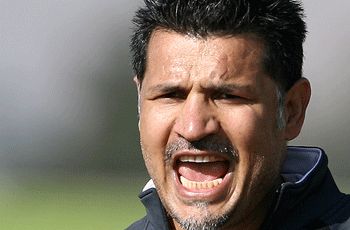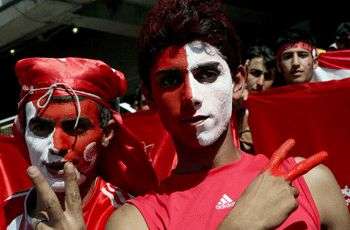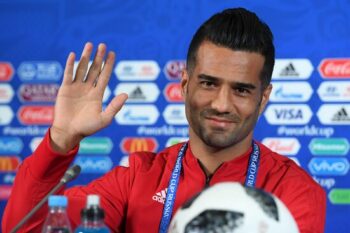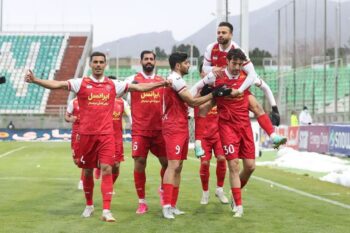How Is Ali Daei Doing At Persepolis?

This is a subject that can get be as fiercely debated, as furiously divisive and as viciously  controversial as Maradona’s ‘Hand of God’. Despite that, it is still necessary to evaluate the decision of the directors of Persepolis to gamble on the playing legend and Daei’s impact at the club so far this season.
controversial as Maradona’s ‘Hand of God’. Despite that, it is still necessary to evaluate the decision of the directors of Persepolis to gamble on the playing legend and Daei’s impact at the club so far this season.
The Reds kicked off the season with several managerial and squad casualties following the raid by the wealthy Steel Azin. Among the losses was former Bayern Munich star Ali Karimi. This was followed by the dismissal of Persepolis’ long-time director, Abbas Ansarifard and the appointment of Habib Kashani. The club’s board of directors however, kept faith with Croatian manager, Zlatko Kranjcar, to continue his reign into the new season.
Kranjcar Didn’t Last Long

In spite of the changes, the Reds’ disenchanting performances early on in the season,
including shocking losses to Steel Azin, Paykan and Sepahan, and stalemates with bitter rivals Esteghlal, Shahin, Rah Ahan and alike, did not help Kranjcar to stay firmly in the hot-seat.
The expected pink-slip issued by Habib Kashani in late December meant that the Croat was relieved of his duties, to be officially succeeded by the former Team Melli manager, and world record goal scorer just three days before the advent of 2010.
The announcement of Ali Daei as the new Reds manager was probably as staggering and divisive as the U.S Federal Government’s second attempt to bail out American banks. Some Iranian pundits promptly criticized Ali Daei’s return to Iranian while others welcomed the idea of giving young Iranian coaches such as Ali Daei and his generation, the chance to prove themselves in the domestic scene.
However, all seemed to share one thing in common regarding Ali Daei’s return to the Tehran-based team, which was a strong indication that this time around, the club’s hierarchy clearly were not in for yet another typical quick-fix form of coaching change.

The Return Of The Legend Ali Daei
Having said that, in the meantime we can quantitatively compare Kranjkar’s coaching impact at Persepolis up until mid-season against Ali Daei’s coaching record as of Round 22 and onward: Out of 29 league games played until the end of March (excluding Elimination Cup games), the Croat led the team for 21 games. Of these, his team recorded eight wins, nine draws, and four losses, ranking third in the league standings with 33 points.
It bears mentioning that at the time that the team were eight points shy of second placed Zob Ahan, and ten points behind table leaders, Sepahan. Hence, position-wise the team were not only struggling to aim for a first spot finish, but were well in danger of losing third to Esteghlal and Steel Azin.
Another retrospective look at Kranjcar’s management, shows that the average points gained by Persepolis in each game was 1.57 points, with the ratio of Average Number of Goals Scored/ Average Number of Goals Conceded being 58% or 0.58 goals scored for every goal conceded.
In comparison, since Daei’s appointment on December 28th, out of eight league games (until the end of March), his club have recorded five wins, two draws and one loss. Though the team’s league position remains unchanged in third spot with 50 points, their points gap with the top two teams has been reduced to a mere four points and nine points off Zob Ahan and Sepahan respectively.
In a sense, Persepolis’ competitive edge in securing a top three finish has been consolidated since Ali Daei’s appointment. The average number of goals scored by the Reds under Ali Daei’s management has improved to 1.5 goals per game, but the defence has weakened as the average number of goals per game conceded by the team has increased to 1.25 goals per game.
Despite that the ratio of average number of goals scored/ average number of goals conceded during this period has seen a spike to that of 120% or 1.2 goals scored for every 1 goal conceded. In addition, the average number of points gained by Persepolis has increased to 2.1 per game.
Our intention here has not been to compare the coaching credentials or ability of the last two Persepolis managers. The objective here is not to resort to hypothetical conclusions that in the long-term a Croatian coach can win a trophy for the Reds, but an Iranian coach cannot or vice versa, or that neither of these two coaches are reputable enough to be even given a chance to prove their worth at a club with the history of Persepolis.

Passion For Persepolis
The intention of this article is rather an attempt to initially compare both coaches’ immediate impact at the club through quantitative measures so all football pundits and fans can fairly comment upon each of the two managers.
Let’s not forget that with big reputations come big expectations, and sometimes without an immediate impact, there will not be enough time to undertake your long-term plans for a club like Persepolis, a bitter truth which Krancjar learned the hard way.
The real ambition of this article is to convince Persepolis directors that they could potentially look beyond a single season contract and genuinely draft a long-term vision for the club with a coach that has their full faith.
All things considered, that would ultimately bring the club’s shortcomings, trophy-drought and the club fans’ agitations to an end and provide a return to past glory days. Currently, opportunity is knocking on Ali Daei’s door; it is now up to the former National team manager to leave his imprint as a coach among fans who watched him attain international acclaim whilst he played there.
He has the opportunity to loosen his stubborn and single-minded approach towards his squad – something he was criticized for doing whilst at the national helm – just as he also has the opportunity to try to establish a closer rapport with fans of the club, a fact which is a necessity rather than a luxury when it comes to managing big teams.
After all in football at the end of the day, the quantitative data, team performances and the managers tactics are all debatable and temporary but what leaves less room for debate is the imprint that a coach leaves on a club when creating an era and legacy which will be judged not simply by trophies in the cabinet.
For the sake of Persepolis, let’s hope that Ali Daei leaves an unforgettable legacy at the struggling Tehran giants.




